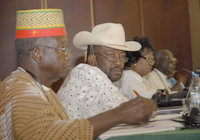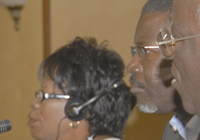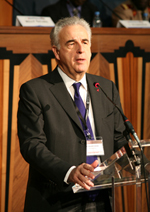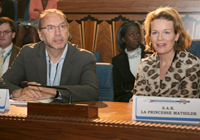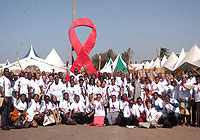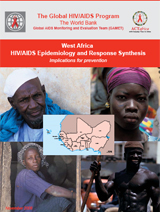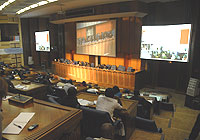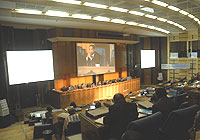
Young women in Dakar, Senegal. Credit: UNAIDS/P.Virot
Sustaining the progress that has been made in preventing new HIV infections and getting more people on antiretroviral treatment are priorities for African countries if they are to get ahead of the AIDS epidemic in the coming years – this is the overarching theme to be discussed at the 15th International Conference on AIDS and STIs in Africa (ICASA) taking place in Dakar, Senegal from 3 to 7 December 2008.
The theme of Africa's leading forum for discussion of HIV developments and trends is “Africa’s Response: Face the facts”.
Experts from UNAIDS, together with many from international and African organizations, civil society groups including people living with HIV, media, and other partners in the AIDS response, will take part in five days of sessions and open forums that will review the successes and challenges to date in Africa’s AIDS response. In particular, international and African experts will evaluate the current state of the HIV and other sexually transmitted infections (STIs) epidemics, assessing political commitments, scientific progress and challenges, community actions, and leadership.
“The AIDS epidemic is not over in any part of Africa,” said UNAIDS Executive Director Dr Peter Piot, who will open ICASA and engage in a number of events, many focused on leadership and youth engagement. “As African countries plan their next steps in addressing AIDS, it is necessary to now take stock of successes and challenges”.
UNAIDS Deputy Executive Director Michel Sidibe, UN Special Envoy Lars Kallings (for Eastern Europe and Central Asia), UNAIDS Special Representatives HRH Princess Mathilde of Belgium and Gaetano Kagwa, as well as several other prominent advocates will be present and contribute to the discussions.
Several sessions are being devoted to ‘knowing your epidemic and your response’, human rights based approaches, including tackling stigma and discrimination, addressing women’s and girl’s vulnerabilities, the role of religion and faith-based organizations, public-private partnerships, technical support to countries, tuberculosis and HIV, and financial mechanisms.
Africa’s AIDS Response
The conference is happening at a unique phase in Africa’s epidemics: the global financial and economic crisis, continued poverty and inequalities pose challenges and obstacles for countries as they find innovative solutions to reducing new HIV infections, curbing AIDS deaths, and getting more people on treatment.
Sub-Saharan Africa remains the region in the world most heavily affected by HIV – there are about 22 million [20.5–23.6 million] people living with HIV in the region.
In 2007, the region accounted for two thirds (67%) of all people living with HIV and for three quarters (75%) of AIDS deaths globally. And AIDS continues to be the leading cause of death in Africa. The nine countries in southern Africa continue to bear a disproportionate share of the global AIDS burden with 35% of HIV infections and 38% of AIDS deaths in occurring in the region.
Despite these sobering figures, progress made over the past few years show that the there are returns on investments in HIV prevention and treatment programmes. As reported in the UNAIDS 2008 Report on the global AIDS epidemic, in a number of heavily affected countries, such as Rwanda and Zimbabwe, changes in sexual behaviour have been followed by declines in the number of new HIV infections. Behaviours include waiting longer to become sexually active, fewer multiple partners, and increased condom usage among people with multiple partners.
UNAIDS and its partners are working with countries to build on HIV prevention results and encourage the implementation of combination HIV prevention as a priority approach – selecting the right mix of behavioural, biomedical and structural HIV prevention actions and tactics to suit epidemics and the needs of those most at risk. National AIDS programmes must also continue to address the factors that continue to put women and girls at risk, while at the same time heighten HIV prevention awareness for other most-at-risk groups, such as sex workers and men who have sex with men.
ICASA is expected to draw around 5,000 participants from a range of countries and backgrounds.




